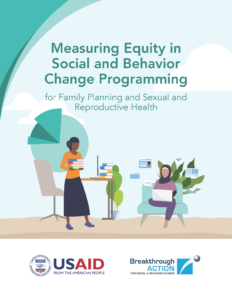
The Measuring Equity in Social and Behavior Change Programming for Family Planning and Sexual and Reproductive Health brief offers straightforward, readily applicable guidance for family planning and sexual and reproductive health (FP/SRH) stakeholders, including government partners, funders, program implementers, and research and evaluation staff who are in positions to measure and address health inequities. With the goal of enhancing health equity, the guide highlights the importance of systematically measuring structural mechanisms of health, particularly individuals’ and groups’ socioeconomic positions through which social groups are stratified and resources are allocated in any given society. By foregrounding the measurement of socioeconomic position, stakeholders can assess who is underserved or unserved and adopt policies, allocate funding, create programs, and measure outcomes to intentionally redress the inequities.
LEARN MORE
RELATED RESOURCES
Expanding the “S” in SBC: Addressing Social Determinants of Health and Health Equity [ENGLISH / EN FRANÇAIS]
Intentionally Incorporating the Social Determinants of Health into SBC Programming for FP [ENGLISH / EN FRANÇAIS]
The Road to Equity in FP: Incorporating the Social Determinants of Health [ENGLISH]
Why Do We Need to Elevate the S in SBC to Improve FP/RH Outcomes?
This webinar made a case for explicitly considering and addressing equity and social determinants of health in social and behavior change programming for family planning and reproductive health.
How Can SBC Programming Address Equity and Social Determinants of Health?
This webinar focused on how social and behavior change programming is well suited to addressing equity and social determinants of health in family planning/reproductive health.
How Can Incorporating Social Accountability Into SBC Improve Equity?
This webinar focused on social accountability as a critical process that can be further leveraged across social and behavior change programming to address equity and social determinants of health to shape and influence family planning and reproductive health outcomes.


